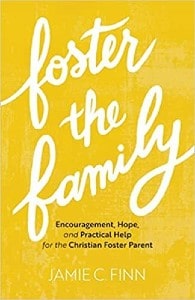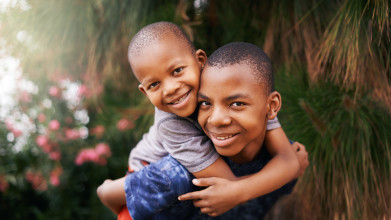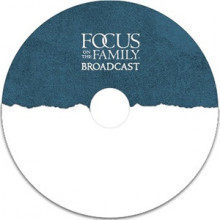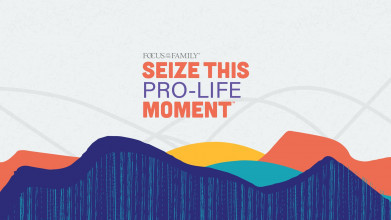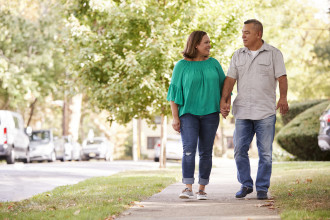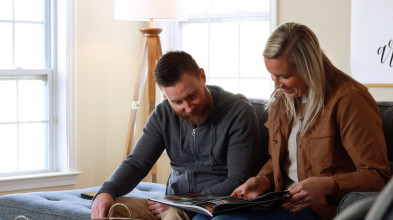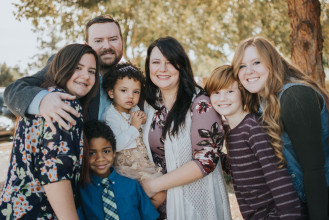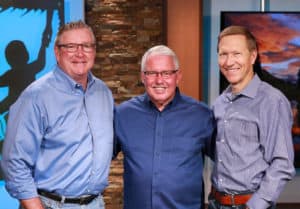Preview:
Jaime Finn: I remember one night I was rocking him to sleep, and I had done all the things, I had fed him and changed him, and he should have been happy in my arms, and he wasn’t. And the answer had to come from something deeper that couldn’t change. It had to come from God and understanding his character, his promises, and really fighting to believe the things that I said I believe.
End of Preview
John Fuller: That’s Jamie Finn talking about the hope that Jesus Christ gives us in our parenting journey. And she joins us today on Focus on the Family to talk about foster parenting and all of the trials and blessings that come with that. Your host is Focus president and author Jim Daly. Thanks for joining us, I’m John Fuller.
Jim Daly: John, I love this topic. I know not everyone is, uh, capable or available to do foster parenting, but I’m telling you folks, uh, we’re gonna cover some territory today that needs to be covered. We have about, oh, just over 400,000 kids in foster care in the United States, about 110,000 of those are available for adoption. And I, you know, when you look at the Christian Church, I can’t think of a field more ripe unto harvest than this one.
John: Mm-hmm.
Jim: And I, I, uh, again, I just don’t think we should have kids in foster care waiting, uh, with the Christian Church if it were active. And I’ll just call it out there and we’re gonna talk about this today. I remember Jean and I; I (laughs) remember we talked about our program Wait No More, which we started here at Focus, really because of my stint in foster care.
John: Yeah. You, you charged us to get something going.
Jim: Yeah, you know, so when we got that going, I got home, and we had aired a program about people getting engaged and trying to call people into that space. And I remember I got home, and Jean said, “Well, if you’re gonna ask others to do it, we should do it.” And I said, “Well, wait a minute, I was the foster kid. (laughs) I already did my time.” And she gave me that stink eye, like, “Nope, that’s not going to cut it.” You know? So we got certified. We probably over a eight-year period had 15, 16 kids through our home. And some of it was amazing and most of it was challenging, and that’s part of it. But I’ll tell you what, um, we know three of the kids who have accepted the Lord because of that engagement.
John: Yeah.
Jim: What is that worth? I’ll leave that out there, let it hang. And today we’re gonna talk about and challenge you to do what James 1:27 says, which is to care for orphans and widows in their distress. Doesn’t get any clearer than that, everybody. And I’m excited about the topic.
John: Yeah. There’s something that we can all do, each and every one of us can do something in this journey. And we’ve invited Jamie Finn here to talk about just what we can do. Uh, Jamie is a foster parent, a speaker, founder of, um, what I’m told is the largest online support group for foster parents, it’s called Foster the Family.
Jim: Yay.
John: And, uh, is the author of a book called Foster the Family: Encouragement, Hope, and Practical Help for the Christian Foster Parent. Stop by focusonthefamily.com/broadcast, or give us a call for your copy, 800, the letter A, and the word FAMILY.
Jim: Jamie, welcome to Focus on the Family.
Jaime: Thank you so much. I’m so happy to be here.
Jim: It’s one of those first-time things, right?
Jaime: Yeah. It’s exciting.
Jim: Yeah, this is great.
Jaime: I’ve seen it, I’ve listened, and now I’m here. (laughs)
Jim: That’s sweet. Thanks for listening. You’re a young mom, right?
Jaime: I am, but I, (laughs) I love your heart for foster care and…
Jim: Well, and, and I love your heart for foster care too. Let’s start with the angelic music, roll the music, (singing), paint a picture for, uh, us about you and Alan’s relationship before foster care (laughs) when everything was simple?
Jaime: Yeah, simple and average. You know, and that’s what we were pursuing this average American life where we had one boy, one girl, we were working and, and doing sort of normal life. And I…
Jim: Which is good.
Jaime: Yeah. It is good. And (laughs), we felt a conviction that there was so much more than just the American dream. And…
Jim: How did you start fostering then? What was the spark? Which one of you, Alan, or you came home-
Jaime: It was me.
Jim: … And said, okay, Alan?
Jaime: It was me. And, and I’ve learned since that that is the common experience of 95% of foster parents.
Jim: Kind of like Jean, right?
Jaime: Exactly.
Jim: If we’re gonna tell people to do it, we better do it.
Jaime: Right.
Jim: Wait a minute. (laughs)
Jaime: Yeah. Well, and my husband had adopted sisters. It was something that we kind of always talked about in a, maybe one day sort of way.
Jim: Let’s camp there for a second-
Jaime: Sure.
Jim: … Because it’s such a normal reaction to say when this is in place when our kids are, I mean, that is kind of normal to think when is the best time?
Jaime: Yeah, sure. Yeah. There is, you know, the ducks in the row sort of way of looking at it. And I think it’s important that we’re prepared, but there’s also nothing that can prepare you. (laughs)
Jim: Right. Thanks for saying that.
Jaime: Yeah.
Jim: Yeah, it’s so true.
Jaime: So for us, it was a step of faith. And for me it was an act of passion. I wanted to follow God into this, for Alan, it was sacrificial obedience.
Jim: Right.
Jaime: It was being compelled by God’s word that God was calling us to do something for the widow and orphan, as you shared that verse.
Jim: Yeah, I’m thinking of that in a sporting event, kind of (laughs) context, uh, you have passion meeting sacrifice, that sounds like conflict.
Jaime: Well, and there wasn’t conflict, I’ll say there was pleading on my part. (laughs)
Jim: Yeah.
Jaime: There was a pleading of here’s the need, here are the stories, and then I realized, oh, my husband is a man of conviction. And if I ask him to go to God’s word, he’s gonna find there, this clear calling. And that clear calling isn’t that everyone become a foster and adoptive parent, but there’s a clear calling that we are stepping in to the vulnerable, and the broken, the lost. When we see the most vulnerable population, we go right to foster children, children who need to be adopted, but there’s also this community of struggling families who we may be able to keep children out of foster care.
Jim: Yes.
Jaime: And so it’s not as simple as become a foster parent. For some families it might be welcome a family into your home for dinner, or bring groceries to that single mom, or help in some way a family who’s struggling, not just jumping in after the state has already gotten involved.
Jim: Right. And that’s great. Those are good things to do. And we’re gonna wrap the program at the end here with some other things people can do. So remember those and we’ll bring them back once again. But let- let’s, uh, speak to the challenges that exist. And I think, you know, we have a program called Wait No More. And it’s pointed at, uh, church members, you know, um, the big “C” church, what do we do, uh, to engage people. And so we work with local churches to set a, a time that people can come and learn more and there’s agencies there. They can get fingerprinted; they could start to process all those good things. But one of the things I’m proud of the team for doing is they do talk about the challenges. These kids come with a lot of emotional, sometimes physical issues, and you have to be prepared. There’s no box that says normal.
Jaime: Mm-hmm.
Jim: And when you qualify your home for a foster situation, you do check boxes of what types of kids, um, emotionally, spiritually, physically you’re able to manage.
Jaime: Mm-hmm.
Jim: And it is a weird experience to go through that, head knocking, um, hoar- food hoarding. I mean, you’re sitting there going, wow, these kids, they have gone through so much trauma that they have issues.
Jaime: Yeah. And that has been what we’ve come to learn. I think we started off with let’s welcome one baby, one time. And part of the idea of a baby was we’ll get a child who’s good as new, a clean slate, and that was sort of the way we came into it. And what we’ve learned since is that trauma is a part of every single child who has entered the foster care system.
Jim: Even prenatal.
Jaime: Prenatal, absolutely. So we’ve had kids come to us from the hospital, who’ve been exposed to drugs, alcohol, chronic stress in utero, in a way that has affected them and will affect them for the rest of their lives.
Jim: I remember, uh, you know, of the 15 kids or so we had two sets of siblings-
Jaime: Mm-hmm.
Jim: … For extended period of times. And the second set was a brother and sister. And I remember the first morning I woke up, “What do you want for breakfast?” “Oh, I’ll have a bowl of cereal.” He was like two years old. And so I made him cereal. And then he said, “Could I have some toast?” “Oh yeah.” Made him toast. “Can I have some eggs?”
Jaime: Yeah.
Jim: Eggs. I mean, within about 10 minutes, there was this mound of food, that no way he was gonna eat that. But it was like his fear, he had food insecurity. And he every morning for about a month, it went this way, where he would just ask, can I have more, can I have more? And I just wanted to prove to him, it’s all available,
Jaime: Yeah.
Jim: you don’t have to worry. But it took about a month.
Jaime: Well, and you could have said that over and over.
Jim: Oh…
Jaime: There’s enough food for you ever.
Jim: It’s not logic.
Jaime: But his brain and body needed to learn that food would show up.
Jim: So that’s part of it. Um, you were challenged by commencement speech involving I think a dollar, (laughs) what happened there and how does it relate to foster care, a buck?
Jaime: Yeah. I went to my best friend’s graduation and the speech was, here’s a dollar, this is your life, you get to spend it once. And that has been a driving force for me, through my life.
Jim: How did it speak to you though specifically?
Jaime: Really believing that this life is something that we are going to spend up that will matter for eternity. And I just so want, even as, you know, a 13-year-old that was put in my heart, of I just want the way I spend my days to matter in eternity.
Jim: That really does get to that scripture in James, you know, this is pure religion.
Jaime: Yeah.
Jim: This is your pure dollar.
Jaime: Right, right.
Jim: Wow. You had an original plan for fostering that wasn’t necessarily what it should have been, I guess, is the way it was described. You know, Jean and I struggle with having that original plan.
Jaime: Yeah.
Jim: One of the things I was really impressed by the parent training that you receive in the foster programs, typically I can only speak to Colorado.
Jaime: Yeah. I’m glad that’s you’re experience.
Jim: No, it was really good.
Jaime: That’s awesome.
Jim: I mean, I thought every parent should get this kind of training about how to raise a child. And I’m not talking about the spiritual elements, it was just very practical about temperament, and anger, and how to embrace your child with love.
Jaime: Yeah.
Jim: I mean, those… These are common themes, right? I think every parent wants that and every foster parent, uh, desires to express that to these kids. But describe your process of wanting to protect those foster kids from their parents.
Jaime: Yeah. I came in with a very naive at best, and I would say arrogant, and sort of savior complex of these kids have been in these homes with these-
Jim: These horrible homes.
Jaime: Yeah. These horrible homes with these abusive addicts who hurt them. And, and that was the mindset I came in with. And I’m so grateful that God rescued me from that.
Jim: What does it sound like in a better way? ‘Cause I… Some of that is real. You’re sitting there going, “Why would you put this two-year-old through this?” I mean…
Jaime: The things our kids have gone through it… They’re heartbreaking.
Jim: A lot of drugs, drug addiction is big and foster.
Jaime: And it’s, yeah, it’s devastating to see the way it affects the kids that we love. But I think what God did in my heart was just the verse, “What do you have that you have not received?” And that went deep into my soul of who I am is only a gift of God, only the gifts that he’s given me in both my family and support system and healthy childhood, but also just in the resources and strength and grace that he’s given me. And I began to view my kids’ parents very differently through a lens of compassion and empathy.
Jim: Well, that’s so good. Um, you have a story where you became very fearful because a little boy, I think you may have changed their names like we all do-
Jaime: I did.
Jim: … But you named them Mikey, was placed in your home. What, what happened with Mikey?
Jaime: He was three months old when he came to us, and he had already been in five homes because he was struggling. (laughs) He was a hard baby who had been through a lot of hard things. And so he was having a hard time and was spending a lot of his time crying and a lot of his time in my arms. And I got to know his mom and I knew how deeply she was struggling. And I remember one night I was rocking him to sleep, and I had done all the things, I had fed him and changed him, and he should have been happy in my arms, and he wasn’t. And fear came into my heart of just, how is she gonna do this? And I was consumed with this idea that she would not be able to keep him safe. And it, it… The answer couldn’t come in her ability because I knew her enough to know how it would be a struggle. The answer had to come from something deeper that couldn’t change. It had to come from God and understanding his character, his promises, and really fighting to believe the things that I said I believe.
Jim: Yeah. I mean, the truth is, and what we believe is Christians, there’s only one entity’s promises that are actually true and always kept and that’s God’s, right, through Jesus. And so that’s a good thing to remember.
Jaime: Right.
Jim: I know that as an orphan kid, you know, people, it’s hard to trust people. Um, you learn over time hopefully to trust people again. But these poor foster kids that trust has been broken in so many ways, that that’s one of the restorations that we in the Christian community need to provide.
Jaime: Yeah. And part of that is gonna be in their spirit and heart, and part of it is gonna be in their brains and bodies.
Jim: Yeah. Yeah. And recognizing that’s critical.
Jaime: Yeah.
Jim: Jamie, you mentioned something I want to hit, uh, for the listener and the viewer right now in the Wait No More program, we’re doing something that we kicked around for a while, but we are really launching it in a big way right now, that Mikey having five homes. Often what happens with these foster children is they get their things thrown into a hefty garbage bag and they drag that garbage bag to the next house, that’s all they have. So one of the things to bring dignity to these kids that we’re trying to do is do a suitcase with a Bible and a Teddy bear.
Jaime: Mm-hmm.
Jim: And we have more demand than we have ability to deliver that. And we just sent, I think we had 2000 distributed in the state of Florida. And we’d love to, again, equip, you know, 400,000 kids, uh, with those suitcases, Bible, and Teddy bears. So if you want to join in that with us, it’s $100 to do that. And, uh, you can do a onetime gift of $100 or do $25 a month, and that over a year, you’ll supply three suitcases to these kids. But it’s one of the small ways to us, but big ways to them that they have a sense of dignity. These kids will get that suitcase, that Teddy bear, and that Bible and, uh, what an amazing way to help buttress them spiritually, physically, emotionally?
John: Yeah. It’s such a great, tangible reminder of God’s love and the fact that somebody cares for them. Well, this is Focus on the Family, uh, with Jim Daly. We’re talking today to Jamie Finn and, uh, she’s got a great ministry called Foster the Family, and she’s come out with a book, uh, titled the same, Foster the Family: Encouragement, Hope, and Practical Help for the Christian Foster Parent. Uh, donate today and get a copy of that book, help us help, uh, those children in the foster system. Our numbers 800, the letter A, and the word FAMILY. And further details are at focusonthefamily.com/broadcast.
Jim: Uh, Jamie, when you had your first biological daughter, uh, you had some health complications that kind of tested that idea that you’re in control of your environment. Oh my goodness, Jean, very similar. I mean just… And I think it’s a great mom attribute, I want to control safety-
Jaime: Sure.
Jim: … Everything, what they learn, what they eat.
Jaime: Sure.
Jim: And guess what? You can’t control that much.
Jaime: Yeah. Yeah. I had a perfect birth plan.
Jim: (laughs)
Jaime: We were going to go to a birth center, and everything was going to be perfect.
Jim: Yes.
Jaime: And a day before my due date, I started having stroke-like symptoms.
Jim: Oh my.
Jaime: I lost control of half my body, and my face was drooping, and I was airlifted to the local hospital. And in a moment my plans were gone. And it was my-
Jim: Oh, my.
Jaime: … Trial by fire, my welcoming to motherhood that I wasn’t going to be able to control anything.
Jim: Wow.
Jaime: And then we became foster parents- (laughs)
Jim: Right.
Jaime: … And really learned that we are not in control of anything.
Jim: It does, it can knock, let me say it this way, it’ll knock sense into you-
Jaime: Yeah.
Jim: … If that makes sense?
Jaime: Yeah.
Jim: You know, you think, all of us as parents think we can kind of control things.
Jaime: Right. No parent is in control.
Jim: No. And that, you know, the Lord chose to give us free will and it definitely comes out in those little children. (laughs)
Jaime: Sure.
Jim: At one point you, uh, came to a breaking point is what you wrote in the book because a little girl you wanted to adopt was pulled away right at the last minute. I would say, you know, again, in that context, when you’re looking to adopt out of foster care, you gotta buttress your heart ’cause there’s a lot of bumpy roads.
Jaime: Yeah. And the reality is that the foster care system has one goal, that the court system and the workers are aligned to, and that is reunification.
Jim: Right.
Jaime: Until reunification, can’t happen. And so I think it’s important that people understand when they’re entering that system, that their hearts and their goals need to stay aligned to what the goal of the system is. And that is not just what the state says, but I also believe it is in union with God’s heart for healing and restoration for something that he created to be made whole again.
Jim: Yeah. What happened in that situation with the daughter, what were the bumpy roads like for you and your husband, Alan?
Jaime: So we said goodbye to our daughter after two and a half years.
Jim: So you had her two and a half years, wow?
Jaime: So that’s part of the bumpiness (laughs), is that…
Jim: How old was she at that point?
Jaime: She came to us at three months old.
Jim: Wow, okay.
Jaime: And she had spent her whole little life with us.
Jim: Yeah.
Jaime: And to say that it was heartbreaking and traumatic is an understatement.
Jim: So you planned on adopting her and some paperwork went crazy? I mean, it’s… This is ridiculous, when I heard the story, I was like, what?
Jaime: Yeah. Well what happened was COVID. And so- (laughs)
Jim: Okay.
Jaime: … The… Everyone got extra time. And I will be honest, at first, I thought, well, this just stole our daughter from us and ruined our lives. And by God’s grace, he changed my perspective to this gave her mom enough time to finally get clean and healthy.
Jim: Okay, so she was… She went back with her bio mom.
Jaime: She did.
Jim: Wow. That’s a great thing.
Jaime: She went back to her biological mother.
Jim: Yeah.
Jaime: And it was 18 months of her mom struggling and they changed the goal to adoption. And then we were, we were happy to go there, but the goal changed when her mom’s health and ability changed. And it was a test of what should we really believe about the family? Not just about trusting God, but about his design for the family and his commitment to restoration and healing. And she’s with her mother and they’re great.
Jim: Yeah. And that’s a good outcome. Sometimes there’s chaos in that reunification too. We had that experience with two kids who went back with the parents and the mom overdosed. And the grandparents weren’t in a position to do anything. They called the dad who’s in rehab, who then calls us and says, “Can you take the kids?” And we’re like, “Definitely we’ll take ’em back, but what happened?” And you know, that happens too.
Jaime: It does.
Jim: Um, and she just could not beat the drug addiction and finally it took her life.
Jaime: Yeah.
Jim: And you know, that is just really sad.
Jaime: It is.
Jim: Um, describe the idea, I mean, this is really interesting and it’s a great metaphor where your, your husband, Alan was laying next to, uh, bed looking under the bed, you walked in the room, what was going on in there?
Jaime: Yeah. I walked into our foster child’s room, and I saw him reaching under the bed and I was like, “Do you need something, what’s going on?” I realized he was reaching under the bed, holding the hand of one of our foster children. And she had a tendency to, when she was afraid-
Jim: Go hide.
Jaime: … Hide.
Jim: Yeah.
Jaime: And we would find her in cabinets, and in corners, and under the bed. And it was a picture for me of my fix-it-ness, my let me come in and make this right, let’s talk about it. And my husband’s bent towards just being with her, just being present and empathetic, and letting her know that he was going to be there with her,
Jim: Yeah.
Jaime: and it just created a beautiful image for me of what it looks like to, you know, we say weep with those who weep, but lie under the bed with those who lie under the bed.
Jim: You know, one of the being in foster care when I was 9 and 10, I can, you know, those memories are scorched into my mind. It wasn’t a great experience. It wasn’t a real healthy, functional family that I was with. And I don’t want to go into all of that. But the point I wanted to make is a child’s heart, their emotional lips are so parched that just those little actions of your husband tears me up, just reaching in under the bed.
Jaime: Mm-hmm.
Jim: That’s something that girl will remember forever.
Jaime: Just the presence.
Jim: And I think, you know, we don’t even understand it’s a little action that in a healthy context, yeah, maybe the kids-
Jaime: Sure.
Jim: … Won’t remember that because there’s so many other good things-
Jaime: Sure.
Jim: … That they’re gonna know. But speaking to the child calmly, running your fingers through their hair, gently, assuring them that they’re loved, those are all things with parched souls that make such a difference.
Jaime: Mm-hmm.
Jim: And that’s what’s so beautiful.
Jaime: Yeah. It’s, it’s really also a picture for me of God’s heart for these kids. Watching my husband with his foster children just reminds me of God’s heart for them, and it’s beautiful to be able to watch that.
Jim: And probably it reinforces why you married him. (laughs)
Jaime: Well, yeah. And it’s-
Jim: Way to go Alan.
Jaime: … It’s especially, right. (laughs) It’s encouraging for me because he didn’t want to do this. You know, you ask him when he wanted to become a foster parent, he says never, but he did it out of obedience and God has, has shaped him into this compassionate man.
Jim: Yeah. Jamie, we said at the beginning, we wanted to come back to practical things people can do, let’s end there.
Jaime: Yeah.
Jim: Um, you know, obviously getting engaged in the foster program in your state, it’s a process. You gotta get your home qualified, they come and inspect it. And each state is slightly different. And it feels intrusive but keeping your eye on the big prize of being engaged at that level, uh, is what it’s all about, it’s for the kids. And even with all the state requirements and you know, policies and regulations, just plow through it, honor those in authority over you and get in there and start doing the work God’s called you to do. Now, there’s other things families can do, what have you learned that really benefits a foster family or a foster adoption family?
Jaime: Yeah. Well you shared Wait No More’s initiative. There are, there are ways like that where we can take the resources that we’ve been given and share them with others. And money is one of our resources. Another one of our resources is our time, our energy, our relationships. And as a foster parent, one of the most meaningful things to me has been people who are willing to be in the trenches with us, who are willing to listen to the, the stress and the heartache, and speak truth in God’s word to us when we’re struggling to trust him. So that has been meaningful, just friendships, but then also the ways that people come and serve us, the ways that people will bring meals, or take out one of our kids, or, you know, bring a, a child to the babysitter or something like that. Those practical ways of we are sort of on the front lines of this and the people in our lives have said, we wanna support you as you… As this is your mission, our mission is to stand with you and support you.
Jim: Yeah, and it’s so, so good. Some of the research that we’ve seen is if you have five families that come around a foster family, or it foster adoption family, that can just help them, do the grocery shopping once in a while, maybe do the laundry for them, come over do the yard work, maybe clean up the house, whatever you can do to support. If you’ve got five families in your corner, it actually becomes a very successful situation. So that’s another thing to do. I’d encourage churches. And don’t go to the pastor and say, “Pastor, can you do this?” Do it yourself within the church, don’t ask him to do it, but just volunteer to lead a foster adoption support group that your church can lean on. I’m so proud of the church here in Colorado Springs, A New Life Church, Brady Boyd, we had lunch, I said, “Here’s what I’m thinking.” He said, “Man, we’ll adopt, I bet we’ll adopt 100 kids out of foster care if we do this.” And we did, and they adopted more than 100.
Jaime: Wow.
Jim: Think of that. And then they put a program in where he talked about all of them becoming cousins, “These are our cousins. We need to take care of them.” And you know, he just did it in such a great way. Every church can do that.
Jaime: Mm-hmm.
Jim: And again, when you look at that, uh, opportunity for us to get engaged, um, man, it’s a field ripe under harvest. And I would just encourage people to do that. Jamie, thank you for this wonderful book, Foster the Family, what a great call. I’m in your corner.
Jaime: Thank you.
Jim: Let us know what we could do for you. (laughs)
Jaime: Thank you.
Jim: And I would really want to turn to the listener, the viewer to encourage you to look at this. Go to the website, fosterthefamilybook.com, and get more of the ideas. Even better, order the book through Focus on the Family and uh, all those proceeds we can put right back into ministry. And I hope you’ll do that as well. If you can support us on a monthly basis, that’s great, and we’ll send you a copy of the book as our way of saying thank you when you do. One time gift is good as well, so just be part of the ministry and let’s do this.
John: Yeah. In any gift you can make today will be greatly appreciated. And as Jim said, we’ll put that to work right away. Our number is 800, the letter A, and the word FAMILY, and further details are at focusonthefamily.com/broadcast. Um, when you get in touch, ask about Wait No More and how you can support, uh, our effort to come alongside these families, activate them, uh, on behalf of foster care kids. Again, our number 800, the letter A, and the word FAMILY.
Jim: And John, let’s again, remind folks they can support the suitcase program, where we provide a suitcase, a Teddy bear, and a Bible to these foster kids. So jump in and do that, Jean and I do that, I hope you’ll help us. And Jamie again, thank you for your heart, you and Alan, for what you are showing others to do, and what’s possible. I so appreciate it. Thank you.
Jaime: Thank you. Thanks for having me.
John: Mm-hmm. And thank you for joining us today. Plan to be with us next time, we’ll hear from Dave and Ashley Willis about having a stronger, healthier marriage.
Preview:
Ashley Willis: I kind of tried to just handle this by myself, which I do not recommend for a while because I, I believe the lie too, that it was just my problem, but in marriage, I wanna make it very clear, it’s never his problem or her problem, every problem and every struggle is our problem, our struggle.
Jim: That is good.
End of Preview










